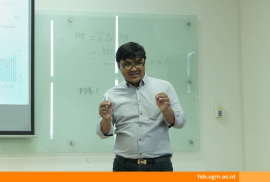The Faculty of Economics and Business (FEB) organized Workshop Series #5 with the theme “Mastering Behavioral Research Qualitative Method”: ZMET: Data Collection & Analysis.” The workshop was held on Friday, November 22, and featured Rokhima Rostiani, S.E., M.Mgt. as the keynote speaker.
The workshop was designed to introduce and deepen participants’ understanding of the Zaltman Metaphor Elicitation Technique (ZMET), a qualitative research method focused on data collection and analysis. It provided theoretical knowledge and practical insights that participants could apply directly.
Rokhima, a lecturer in the Department of Management, explained that ZMET is a qualitative research technique designed to explore individuals’ subconscious thoughts through image-based stimuli. According to her, this method effectively uncovers thoughts or emotions that are difficult to express in words.
“A picture is worth a thousand words,” she emphasized, noting that images can serve as powerful metaphors for understanding the deep meanings within human memory.
She explained that ZMET is particularly suited to studying emerging phenomena where a clear understanding of the research question has yet to be established. Researchers can use this technique to delve into the deepest layers of participants’ perceptions and experiences.
ZMET is known as a highly structured qualitative method that consists of eight main steps: selecting images, categorizing images, eliciting constructs, identifying images that best represent the topic, identifying images that oppose the topic, describing sensory impressions, exploring relationships between images (optional), and identifying connections between visual elements.
Rokhima explained that the first step involves thorough preparation, including defining keywords, designing a participant matrix, and securing respondent consent. Data is collected through open-ended interviews supported by tools such as video, audio, transcripts, and researcher notes.
Although no specialized software is required, Rokhima noted that collaborative platforms such as Miro.com can be used to map visual data. However, she emphasized that the researcher’s ability to perform in-depth manual interpretation remains paramount.
“By mastering the steps of ZMET, researchers can explore previously difficult aspects to uncover,” she concluded.
Reportase: Orie Priscylla Mapeda Lumalan
Editor: Kurnia Ekaptiningrum
Sustainable Development Goals







